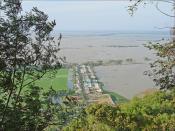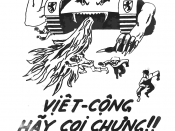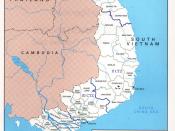Australia's Involvement in Vietnam War and the Communism Threat
The Vietnam War had important social and political effects on Australian society. Reasons for the Australian entry into the Vietnam War were complex but were dominated mainly by a fear of the spread of communism throughout Asia in the Cold War period, and a desire to ensure the support of the United States if Australian security should be threatened in the future. In the years preceding the Vietnam War, there were many close calls with insurgent communism dating right back to World War 2. All of these plus others contributed to the Australian belief that we join the Vietnam War.
The reasons as to why Australia became involved in the Vietnam War have been traditionally painted in the colours of "collective security" and as part of the anti-Communist "crusade" to contain a world wide communist threat.
Perhaps most important of these was a very poor perception by the Government of world affairs at that time.
Throughout the late fifties and sixties Australian diplomatic circles were firmly convinced of a rebellious "Communist Threat" outside Australia. This threat, initially directed by Moscow, and later by Beijing, dominated Australian diplomatic thought for approximately fifteen years.
The anti- Communist policy of the government under Menzies became electorally self-rewarding and they sought to use it wherever possible. This does not deny that they were not totally convinced for the best of reasons but that they also managed to convince the electorate that Communism must be opposed wherever possible.
When Menzies made his statement suggesting, "The takeover of South Vietnam would be a direct military threat to Australia," the anti-Communist convictions developed over the previous five years were now convincing them to intervene and this action led Australia into the "dilemma of the Vietnamese civil war."
Communism was seen as an aggressive force to destroy the western society of capitalism and democracy. In 1945, there was one Communist state in the world, Russia by 1949 with the establishment of the Communist Peoples' Republic of China led by Chairman Mao, 11 countries were now communists. The Australian Government was also concerned that United States involvement in the South East Asian area should be encouraged and supported in case of future threats in the region.
With this growing fear in mind, Australia had long suffered from a sense of unease about its position as the only European settled country in Asia. Australian society had long harbored a fear of the "yellow hordes" waiting to "descend upon Australia" and steal it away from the privileged few white colonialists living here.
The fear of this Communist aggression was founded upon what was referred to as the "Domino Theory" by its exponents. Unless this aggressive action by China was stopped in Vietnam, the theory ran, that after Vietnam had fallen, the surrounding countries would follow, just like a row of Dominoes. These countries, which tended to be neutral in their outlook, favouring neither east nor west, might become involved in another war like Vietnam, or they might defect to the Communist line. It was feared that this "domino" action would eventually lead to Australia's shores and then the policy of forward defence would mean the war would be in Darwin instead of Vietnam and Australia would be in imminent danger.
The involvement of Australian forces in Vietnam was a continuing development of increasing commitment that took place over a period of several years against a background of Cold War concerns with regional security and fear of Communist expansion. The basis of Australian defence planning in the early 1960s was 'forward defence', a concept which complemented the United States policy of 'containment' of Communism in south-east Asia and embraced Australia's obligations under the South-East Asia Treaty Organisation (SEATO) formed in 1954. This provided for defensive action to be taken in the event of an attack on the USA, Britain, France, Australia, New Zealand, Thailand or Pakistan. South Vietnam, Cambodia and Laos were also guaranteed protection.
The other main alliance that Australia had that helped in security was the ANZUS Agreement signed in 1951. This formalised the relationship between Australia, America and New Zealand and one would come to the other's aid in the event of attack.
The Malayan Emergency (1948-60) was the only war the West won against insurgent communism. It was an intense 12-year jungle war fought by the British, British Commonwealth and Malay forces against the guerrillas of the Malayan Communist Party (MCP) led by Communist fanatic Chin Peng. Australia contributed troops in 1950, to help the British in preventing Malaya becoming a communist state of China.
In 1960, Indonesian president Sukarno claimed Dutch-controlled territory of Western Papua New Guinea for an independent Indonesia. Strong communist influences in the Indonesian government gave rise to a sense of threat and communist aggression close to Australian territory, so Australia pulled out of the dispute against who should own the territory seized.
For many Australians who had lived through World War 2, there was greater fear because they could see the parallels between the imminent threats of invasion through communism with the threat that the Japanese had produced 20 years earlier. The same sort of pattern could be seen with the domino effect, how they were slowly jumping from country to country gaining more power and Australia would be at threat if action weren't taken. As it was when Japan closed in on Australian shores, the only real solution was to send troops off to contain and stop forces before they reached our land and became a direct military threat.
Politics Australia had reasons for wanting to join the Vietnam War, quite apart from considerations of South Vietnamese independence. It was considered necessary to maintain good relations with our alliance partners the USA and constituted a critical step in maintaining a defence on our home front. Initially, Australia provided financial support to the Republic of Vietnam (RVN), and when widespread conflict became more extensive, Australia provided military advisers. The United States, who had been keen "observers" of the conflict, soon committed itself to military intervention and Australia wished to show their support. The problem was, that the South Vietnamese government was not so convinced of the usefulness of Australia's presence. The official reason of Australia's decision to enter the Vietnam War holds that Australia, at the request of the South Vietnamese government, and together with the noble American nation entered (reluctantly) into war, to safeguard the world from communist peril.
The geopolitical case for our commitment was equally simple. The American presence in South Vietnam was seen as an extension of the principle of containment. That principle had it that in the interests of avoiding a global war no great attempt would be made to liberate countries, which had fallen to communism, but the spread of communism, inevitably by dictatorial means, would be resisted. Communism would be 'contained' within its existing borders.
Due to our widespread fear, Australia sent many troops and put in large amounts of funding to ensure our security. Also compulsory conscription was undertaken, which was very unpopular. According to the Nominal Roll of Australian Vietnam Veterans, more than 59,000 Australians served in Vietnam during the period of the war. The official estimate of the cost of the War, above the normal cost of maintaining the armed forces in Australia, was $43 million at the time of peak involvement between 1967 and 1970, amounting to a total of $218.4 million from 1962 to March 1972.
Australia's military involvement in the Vietnam War was the longest in duration of any war in Australia's history. However it was also successful in its outcome of having Australia avoid the invasion of communism. It was a time when we stood by our allies as we looked after them as they looked after us. Together as allies we were able to stem the threat of communism that we had been growing fearful of. The Vietnam War was one that changed Australia forever.
â¦â¦â¦â¦â¦â¦â¦â¦â¦â¦â¦â¦â¦â¦â¦â¦â¦â¦â¦â¦â¦â¦â¦â¦â¦â¦â¦â¦â¦â¦â¦â¦â¦â¦â¦â¦â¦â¦â¦â¦
BIBLIOGRAPHY
http://www.hotkey.net.au/~marshalle/austinvol/aust2-3.htm
www.tgs.qld.edu.au/louise/louise2.htm
www.awm.gov.au/atwar/vietnam.htm
www.eurekatimes.net/Australian%20Defence/vietnam.htm
www.pwc.k12.nf.ca/coldwar/plain/vietnam.html
http://ca.essortment.com/malayanemergenc_rwnt.htm
http://www.faqs.org/qa/qa-1885.html
www.naa.gov.au/Publications/fact_sheets/FS117.html
www.schools.ash.org.au/immanuel/htm/vietnamwar.htm
Encyclopaedia Britannica 2000 (CD-Rom)
Retroactive 2 (School Resource Book)


